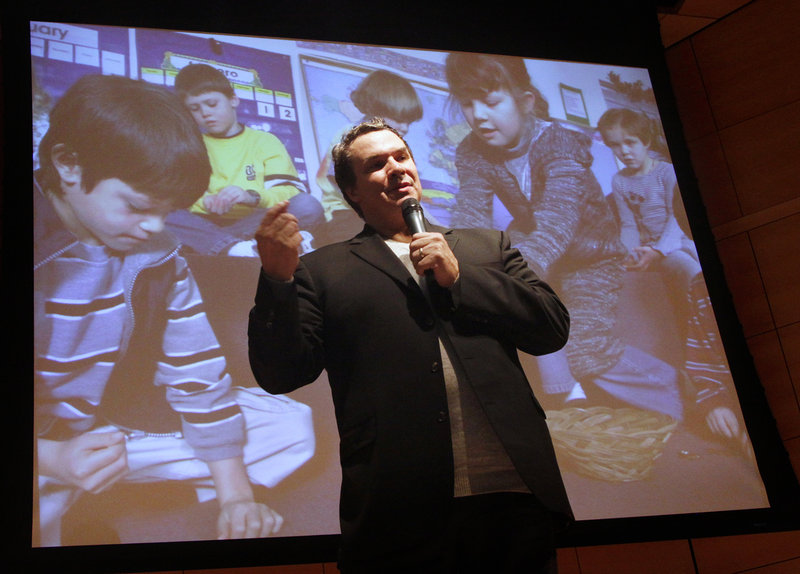In recent years, the book “Three Cups of Tea” has inspired schoolchildren throughout Maine to save their pennies to help build schools in remote parts of Pakistan and Afghanistan.
Public libraries have hosted “community reads,” bringing people of all ages together to read Greg Mortenson’s 2006 best seller and learn about his efforts to promote education and understanding across the globe.
Mortenson received an honorary doctorate when he spoke at the Colby College commencement in Waterville in May 2009, and he drew an overflow crowd of nearly 600 people when he spoke at the University of Southern Maine in Portland last October.
“Few books capture people’s imaginations and appeal to their interest in other cultures the way ‘Three Cups of Tea’ did,” said Robert Waldman, director of the York Public Library, which hosted a community read of the book, co-written by David Oliver Relin, in March 2009.
“It was very appealing to think that we can make this world a better place,” Waldman said. “It empowered people to make their own lives richer by helping others.”
All of that good will was overshadowed last week when “60 Minutes” aired a segment alleging that key portions of “Three Cups of Tea” and its sequel, “Stones Into Schools,” were fabricated.
In particular, the CBS News program cast doubt on Mortenson’s account of getting lost while mountain climbing in Pakistan in 1993 and promising to build a school for villagers who cared for him, and on his account of being captured by the Taliban in 1996.
The program also claimed that financial statements for Mortenson’s Central Asia Institute “show a lack of transparency and a troublesome intermingling of Mortenson’s personal business interests with the charity’s public purpose,” according to a program transcript.
While the institute took in $23 million in contributions last year, it spent $1.7 million helping Mortenson promote his books — more than the amount spent building schools in Pakistan during the same period, according to the transcript.
At the same time, the institute receives no income from Mortenson’s books and little from his $30,000 speaking engagements, according to the transcript.
Over the years, “Three Cups of Tea” has sold 4 million copies, and his charity has received nearly $60 million in donations.
The program also questioned Mortenson’s claim to have built 141 schools in Pakistan and Afghanistan; half of 30 schools checked by “60 Minutes” were either empty, built by somebody else or being used for other purposes.
Mortenson declined to be interviewed for the news program. In a written statement, he said he stood by information “conveyed” in the book and the value of the institute’s work “empowering local communities to build and operate schools that have educated more than 60,000 students,” according to The Associated Press.
He also said his book contained “a compressed version of events that took place in the fall of 1993.”
On Tuesday, two days after the “60 Minutes” report, Montana’s attorney general launched an inquiry into the financial activity of the institute, headquartered in Bozeman, Mont., where Mortenson lives.
CharityNavigator.org, which reviews philanthropic organizations, posted a “donor advisory” on the usually four-star rated institute, providing links to recent news stories and the institute’s responses.
Amazon.com posted a notice on Mortenson’s books from Viking Press, saying “60 Minutes is a serious news organization, and in the wake of their report, Viking plans to carefully review the materials with the author.”
In Maine, the reaction has ranged from disappointment to disbelief.
“I think we’re surprised at what we’ve heard,” said Judie O’Malley, a USM spokeswoman who read “Three Cups of Tea” and saw Mortenson speak last fall. After Mortenson’s lecture, many in the audience lined up to have him sign their books.
“He seemed like a really sincere guy,” O’Malley said. “His first book, especially, struck a chord with everyone who came to see him. He raised awareness and brought to light a different way of doing things by requiring a commitment from the communities he sought to help.”
Michael Dubyak, chief executive officer of Wright Express, said Mortenson was “one of my heroes” when the company sponsored the author’s USM visit.
In the wake of the “60 Minutes” report, Dubyak declined to talk about Mortenson. The company sent a written statement expressing its surprise at recent news reports and emphasizing that it has no connection with Mortenson.
Ron Bancroft, a strategy consultant, read “Three Cups of Tea” in the summer of 2007, along with his wife, Sally. He wrote a column about it — titled “Pair of books lend depth to a summer’s reading” — for The Portland Press Herald.
“We’re both very disappointed because it appears he exaggerated his experiences,” Bancroft said of recent news reports.
“It’s kind of unfortunate, but it doesn’t detract from the fact that he has built schools where they were desperately needed,” Bancroft said. “The fellow seems to have a knack for raising awareness and bringing people together. I haven’t lost faith in Greg.”
How Mortenson’s book will be used in Maine classrooms going forward remains to be seen.
It has been required reading for U.S. service members heading for Afghanistan and for members of the Senate Foreign Relations Committee.
David Galin, chief academic officer of Portland schools, said the news about Mortenson should be handled delicately with students who have read “Three Cups of Tea” in class. He witnessed its impact on his daughter, Sophie, when she was a second-grader at Hall Elementary School in 2009-10.
Students made their own teacups from clay, and the school raised $481.06 for Mortenson’s Pennies for Peace campaign.
“The whole school got involved, and she really enjoyed that,” Galin said. “Building schools is something kids can understand and connect with. Any time I see my child connecting with the larger world, I think it’s important.”
That said, Galin plans to encourage teachers and parents to turn the current controversy into a learning experience. About getting the full story before jumping to conclusions. About what happens when something you thought was true turns out to be false. About why somebody doing good work would lie to make it seem more exciting.
“This situation isn’t black and white,” Galin said. “People around the world have benefited from contributions made by our students. The lesson contained in the book stands: Building schools changes people’s lives.”
Staff Writer Kelley Bouchard can be contacted at 791-6328 or at:
kbouchard@pressherald.com
Send questions/comments to the editors.




Success. Please wait for the page to reload. If the page does not reload within 5 seconds, please refresh the page.
Enter your email and password to access comments.
Hi, to comment on stories you must . This profile is in addition to your subscription and website login.
Already have a commenting profile? .
Invalid username/password.
Please check your email to confirm and complete your registration.
Only subscribers are eligible to post comments. Please subscribe or login first for digital access. Here’s why.
Use the form below to reset your password. When you've submitted your account email, we will send an email with a reset code.